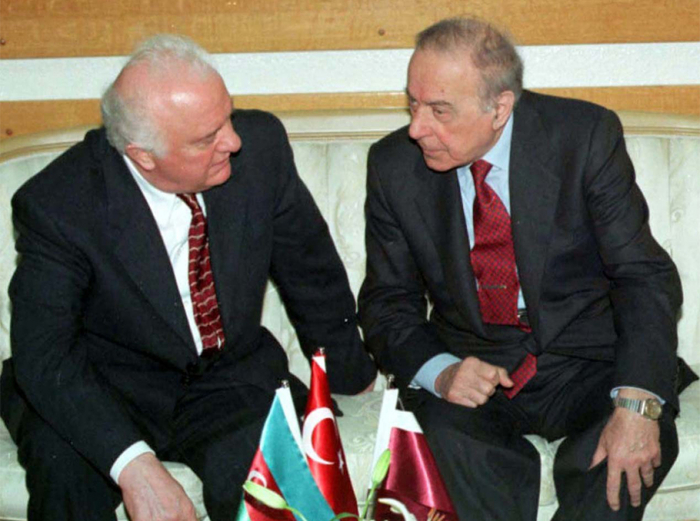Mikhail Gorbachev was hostile to the Aliyev family - National Leader Heydar Aliyev and Ilham Aliyev, who was a teacher at the Moscow State Institute of International Relations (MSIRI) at that time. Due to his hostility, Gorbachev instructed the then-foreign minister Shevardnadze to dismiss Ilham Aliyev as a teacher at MSIRI, which was operating under the USSR Foreign Ministry.
At that time, Gorbachev had great confidence in Shevardnadze. By appointing Ilham Aliyev as a teacher at another department, Shevardnadze could convince Gorbachev that he had “fulfilled his instruction”. However, Shevardnadze did not oppose Gorbachev’s instruction regarding Ilham Aliyev.
Sometime after Shevardnadze came to power in Georgia, he admitted cooling in his relationship with Heydar Aliyev while responding to a question from a journalist of the Azerbaijani-language Soviet Azerbaijan newspaper at a conference. After this, National Leader Heydar Aliyev forgave Shevardnadze's betrayal of his son.
Despite the war between Armenia and Azerbaijan in the early 1990s, Georgia was experiencing the worst period in the region. Azerbaijan resurrected Georgia with its "unrecorded" comprehensive aid. Heydar Aliyev saved both Azerbaijan and Georgia. Later, both National Leader Heydar Aliyev and President Ilham Aliyev made invaluable contributions to the Georgian people and statehood. At a time when a thousand cubic meters of gas were selling at $350-400 in global markets, Azerbaijan offered Georgia its gas for $60.
If someone associates Azerbaijan's role in Georgia's energy sector solely with the export route for its natural gas, they are mistaken. While Georgia benefits from being a transit country, Azerbaijan's choice also created additional security risks from Iran and Russia. Former Georgian President Mikheil Saakashvili twice admitted that Azerbaijan's gas and electricity supplies caused difficulties for them.
One of the key issues is that Azerbaijan supplies natural gas to heat religious temples in Georgia. This initiative originated with the Georgian Orthodox Church, and Armenian churches in Georgia also benefit from this source of heating.
The attitudes of Armenians towards Azerbaijan's oil and gas policy, particularly after the signing of the "Contract of the Century," warrant specific analysis. Initially, they expressed skepticism regarding the contract's validity. Allegations arose that Armenia promoted the idea of Azerbaijan's oil and gas reserves being depleted. However, after the contract's signing, their approach shifted. Armenia began obstructing the construction of Azerbaijan's oil and gas pipelines, leading to a significant political and diplomatic struggle. When their efforts proved unsuccessful, Armenians in the United States lobbied the US government to include Armenia in Azerbaijan's oil and gas projects, urging pressure on Baku. The Armenian diaspora in Europe echoed this sentiment. While Azerbaijan did not formally object, they conditioned participation on Armenian recognition of Azerbaijan's territorial integrity. This condition proved to be a dealbreaker, leading both Armenia and the diaspora to exclude themselves.
Heydar Aliyev's pursuit of regional integration remains a cornerstone policy, recognized as a legitimate approach in the international community. This course was continued by President Ilham Aliyev. However, the West's waning focus on the region and the sidelining of certain programs have created present challenges. Should the West, particularly the United States, re-engage with its prior approach, regional security could strengthen, integration could commence, and the South Caucasus could evolve into a self-sufficient region through the creation of a unified economic space.
Armenians can play a unique role in this endeavor. While regional products are currently absent from the American market, a significant Armenian diaspora resides in the United States. Additionally, Armenians hold considerable influence in European trade centers. Through cooperation, the three countries could collectively bring their products to these markets. However, Armenia's historical narratives currently impede progress.
Mubariz Ahmadoglu, Director of the Center for Political Innovation and Technologies, exclusively for AzVision.az
More about:
















































